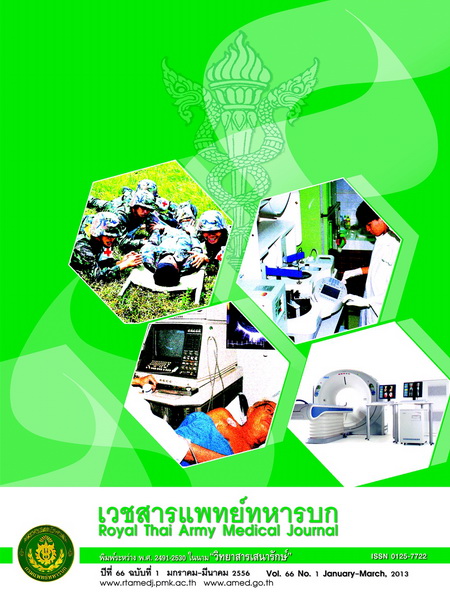การประเมินอุณหภูมิกายที่วัดทางรักแร้ด้วยเทอร์โมมิเตอร์ชนิดปรอทแก้วและดิจิตอลเทอร์โมมิเตอร์ในทารกครบกำหนด
Main Article Content
บทคัดย่อ
Background: The standard measurement of rectal temperature in newborns has currently been replaced by axillary temperature using mercury-in-glass or digital thermometer due to its convenience and safety. However, there is no definite conclusion regarding the best method of measuring axillary temperature in newborn infants.
Objective: To evaluate the precision of axillary temperature measurement using mercury-in-glass and digital thermometers in comparison with standard rectal temperature in term newborns.
Material and method: The temperatures of healthy, term infants were measured after birth. Three methods of temperature measurements were serially performed: (1) rectal temperature using mercury-in-glass thermometer for 3 minutes, (2) axillary temperature using mercury-in-glass thermometer for 7 minutes and (3) axillary temperature using digital thermometer model Terumo C202 for 1.5 minutes.
Statistical analysis: The comparison of data was analyzed by using paired t-test.
Results: Seventy-five healthy term infants were enrolled into the study. There were 10 infants having rectal temperatures out of normal range; 2 cases (2.67%) below 36.5°C and 8 cases (10.67%) above 37.5°C. Comparing with rectal temperature, the mean differences of axillary temperature measured by using mercury-in-glass and digital thermometers were 0.26 °C (95%CI 0.20 to 0.31, p < 0.001) and -0.02 °C (95%CI -0.08 to 0.04, p=0.482), respectively.
Conclusion: Temperature measurement using axillary digital thermometer is closely related to rectal temperature and could be used for monitoring temperature in healthy term newborns.
Downloads
Article Details
บทความในวารสารนี้อยู่ภายใต้ลิขสิทธิ์ของ กรมแพทย์ทหารบก และเผยแพร่ภายใต้สัญญาอนุญาต Creative Commons Attribution-NonCommercial-NoDerivatives 4.0 International (CC BY-NC-ND 4.0)
ท่านสามารถอ่านและใช้งานเพื่อวัตถุประสงค์ทางการศึกษา และทางวิชาการ เช่น การสอน การวิจัย หรือการอ้างอิง โดยต้องให้เครดิตอย่างเหมาะสมแก่ผู้เขียนและวารสาร
ห้ามใช้หรือแก้ไขบทความโดยไม่ได้รับอนุญาต
ข้อความที่ปรากฏในบทความเป็นความคิดเห็นของผู้เขียนเท่านั้น
ผู้เขียนเป็นผู้รับผิดชอบต่อเนื้อหาและความถูกต้องของบทความของตนอย่างเต็มที่
การนำบทความไปเผยแพร่ซ้ำในรูปแบบสาธารณะอื่นใด ต้องได้รับอนุญาตจากวารสาร


